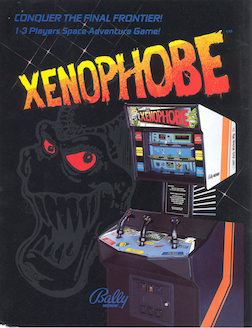
Xenophobe is a video game developed by Bally Midway and released in arcades in 1987. Starbases, moons, ships, and space cities are infested with aliens, and the players have to kill the aliens before each is completely overrun. The screen is split into three horizontally-scrolling windows, one for each of up to three players, yet all players are in the same game world.

720° is a skateboarding video game released in arcades by Atari Games in 1986. The player controls a skateboarder skating around a middle-class neighborhood. By doing jumps and tricks, the player can eventually acquire enough points to compete at a skate park. The game's name comes from the "ultimate" trick, turning a full 720° in the air after jumping off a ramp.

Tapper, also known as Root Beer Tapper, is an arcade video game developed by Marvin Glass and Associates and released in 1984 by Bally Midway. Tapper puts the player in the shoes of a bartender who must serve eager, thirsty patrons while collecting empty mugs and tips. It was distributed in Japan by Sega in 1984.

Spy Hunter is a vehicular combat game developed by Bally Midway and released for arcades in 1984. The game draws inspiration from the James Bond films and was originally supposed to carry the James Bond brand. The object of the game is to drive down roads in the technologically advanced "Interceptor" car and destroy various enemy vehicles with a variety of onboard weapons. Spy Hunter was produced in both sit-down and standard upright versions with the latter being more common. The game's controls consist of a steering wheel in the form of a futuristic aircraft-style yoke with several special-purpose buttons, a two-position stick shift, and a pedal used for acceleration.

Pac-Land is a 1984 side-scrolling arcade platform game developed and released by Namco. It was distributed in North America by Bally Midway, and in Europe by Atari Games. Controlling Pac-Man, the player must make it to the end of each stage to return a lost fairy back to its home in Fairyland. Pac-Man will need to avoid obstacles, such as falling logs and water-spewing fire hydrants, alongside his enemies, the Ghost Gang. Eating large flashing Power Pellets will cause the ghosts to turn blue, allowing Pac-Man to eat them for points.

Tron is a coin-operated arcade video game manufactured and distributed by Bally Midway in 1982. The game consists of four subgames inspired by the events of the Walt Disney Productions motion picture Tron released earlier in the summer. The lead programmer was Bill Adams. The music programmer was Earl Vickers.

Super Pac-Man is a 1982 maze chase arcade game developed and published by Namco. It was distributed in North America by Midway, and is Namco's take on a sequel to the original Pac-Man; Midway had previously released Ms. Pac-Man, which Namco had little involvement with. Toru Iwatani returns as designer.

Rampage is a 1986 arcade video game by Bally Midway. Inspired by monster films, players control a trio of monsters: George, Lizzie, and Ralph, humans turned into creatures due to various experimental mishaps. The objective is to destroy cities and combat military forces while maintaining their health. The game is set across 128 days in cities across North America, with each cycle repeating five times. Gameplay includes destroying buildings, eating humans, and avoiding damage.
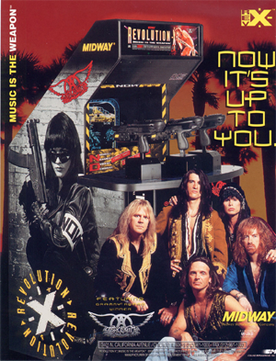
Revolution X is a shooting gallery video game developed by Midway and released in arcades in 1994. The gameplay is similar to Midway's earlier Terminator 2: Judgment Day, but is themed around the band Aerosmith. The oppressive New Order Nation regime and their leader Helga have abducted Aerosmith, and players use a mounted gun to control onscreen crosshairs and shoot enemies. The members of Aerosmith are hidden throughout the game's international locales and must be found in order to receive the game's true ending.
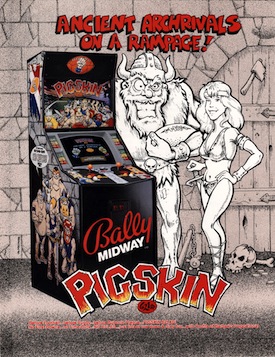
Pigskin 621 A.D. is an arcade game released in 1990 by Midway Manufacturing under the "Bally Midway" label. One player can battle the computer, or two players can battle head-to-head. Two teams compete to score as many touchdowns as possible in the tradition of American football, but actual play is more similar to rugby football.
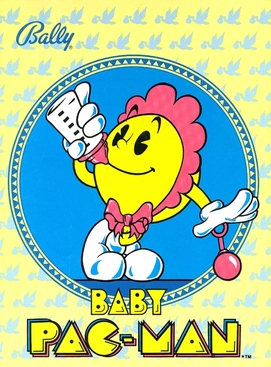
Baby Pac-Man is a hybrid maze and pinball game released in arcades by Bally Midway on October 11, 1982, nine months after the release of Ms. Pac-Man. The cabinet consists of a 13-inch video screen seated above a shortened, horizontal pinball table. The combination fits into roughly the same size space as an upright arcade machine. 7,000 units were produced.

Bump 'n' Jump is an overhead-view vehicular combat game developed by Data East and originally released in Japan as Burnin' Rubber. Distributed in North America by Bally Midway, the arcade version was available as both a dedicated board and as part of Data East's DECO Cassette System. The goal is to drive to the end of a course while knocking enemy vehicles into the sides of the track and jumping over large obstacles such as bodies of water.

Professor Pac-Man is a quiz arcade game that was produced by Bally Midway and is the seventh title in the Pac-Man series of games, which was released in August 1983. It is also the last of only seven games from Bally Midway Manufacturing to run on their Midway Astrocade hardware. Only 400 cabinets were made; many of these were returned to the manufacturer and converted to Pac-Land cabinets.

Domino Man is an arcade game released by Bally Midway in 1983. The player controls Domino Man, a bespectacled, balding man, wearing a beat-up turtleneck sweater and sporting a mustache, who attempts to set up a number of giant dominoes across the screen. The background music is "Maple Leaf Rag" by Scott Joplin.
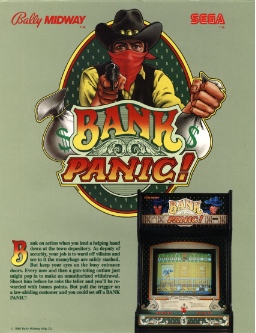
Bank Panic is an arcade shooter game developed by Sanritsu Denki and released by Sega in 1984. Bally-Midway manufactured the game in the US. The player assumes the part of an Old West sheriff who must protect a bank and its customers from masked robbers.

Wizard of Wor is an arcade video game released in 1981 by Midway. Up to two players fight together in a series of monster-infested mazes, clearing each maze by shooting the creatures. The game was ported to the Atari 8-bit computers, Commodore 64, Atari 2600, and Atari 5200 and renamed to The Incredible Wizard for the Bally Astrocade. The original cartridge came with a cash prize offer to the first person to complete the game.

Journey is an arcade video game released by Bally Midway in 1983. Rock band Journey had enjoyed major success in the early 1980s, and Bally/Midway decided to ride this wave of popularity by creating an arcade game based on the group. Its release was intended to coincide with a US tour by the band.

Wacko is a 1983 arcade game by Bally Midway. It featured a unique angled cabinet design and a combination of trackball and joystick controls.
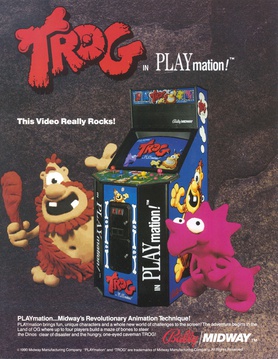
Trog is a maze arcade video game developed and published by Midway Manufacturing in 1990 in North America under the "Bally/Midway" label and later by Williams Electronics in Europe. In the game, players control one of four dinosaurs chased by the titular cavemen. Its gameplay includes elements of Pac-Man—collect all items in a maze, eat a special item to turn the tables on pursuers—but supports up to four players at once. Initially envisioned as a hybrid puzzle/strategy project, its original concept was later reworked into a Pac-Man-like title after poor reception from testers and features claymation graphics, advertised as "Playmation" by Midway. Conversions for the Nintendo Entertainment System and MS-DOS were released by Acclaim Entertainment in 1990 and 1991 respectively, reducing the number of simultaneous players to two. Both the arcade and NES versions garnered positive reception from critics.

The Champion Pub is a pinball game released by Williams Electronics Games in 1998. The theme of the game revolves around boxing in a 1920s pub.



















